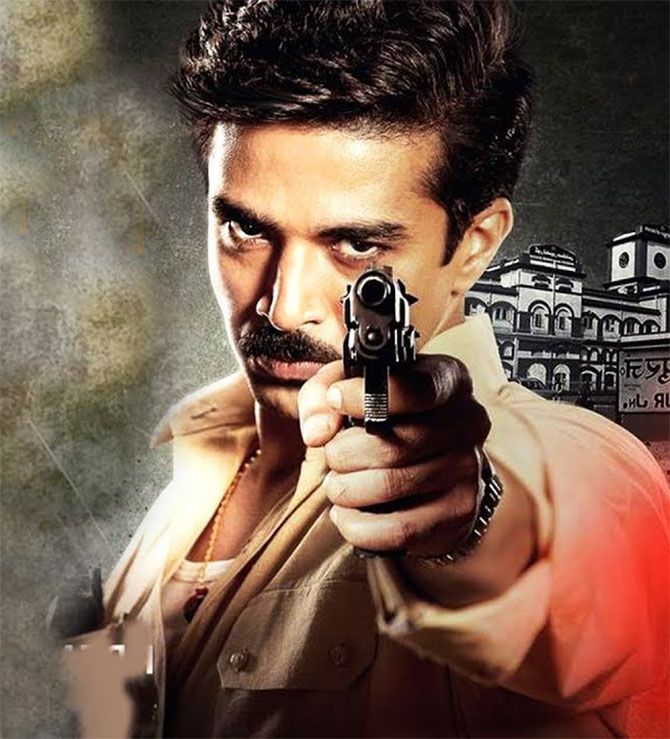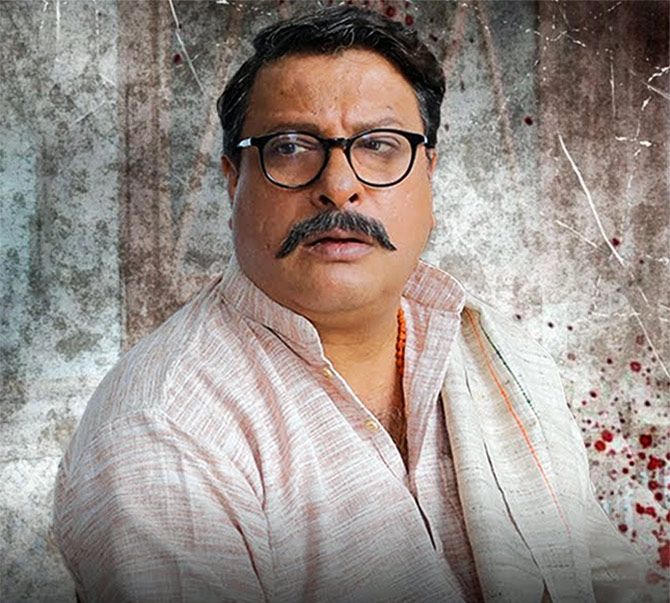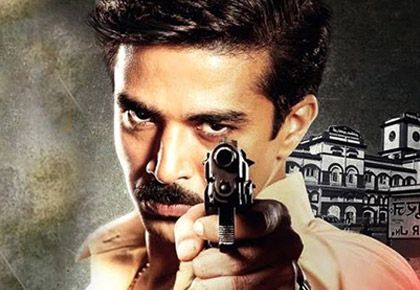'A big reason for its low recall value is that Rangbaaz's colourful characters are all essentially punks,' feels Sreehari Nair.

There's always a case to be made in favour of an art form that gives the actor in Tigmanshu Dhulia the freedom to expand naturally.
In Rangbaaz, Dhulia is allowed to use his entire range of sighs, grunts, slurps, and random hand and head movements -- basically all those little 'physical tics' that would have been anathemas to the editor of a motion picture.
But Rangbaaz is a Web Series, and after watching a few this year (like Sacred Games and Mirzapur), one can safely say: What we have here is an Actor's Medium.
Here's a medium in which Dhulia's politician character, Ram Shankar Tiwari, can hold out a cellular phone and look all around the room for someone to collect it.
A wonderful touch.
Sure it adds to the length of the scene, but in a Web Series, those extra seconds can be viewed as sacrifices at the altar of 'Character Flavouring.'
Rangbaaz also proves (as Sacred Gamesand Mirzapur had, before it) that the Web Series is a Writer's Medium (maybe more than a Director's Medium).
I would go so far as to say that the Web Series is distinctly 'novelistic' in terms of the storytelling possibilities it opens up.
So the story of Shiv Prakash Shukla (Saqib Saleem), a Gorakhpur-based gangster from the 1990s may follow the arc of The Evil Man who eventually pays for his misdeeds, but in a Web Series (as in a novel), you get to really goose up this hackneyed arc.
Overtly, Rangbaaz cuts between a story set in 1998, of Shiv Prakash Shukla being trailed by a team of police officers (led by Ranvir Shorey's Siddharth Pandey), and a story set in 1993, of Shukla's metamorphosis from college-going boy to blood-lusting gangster.
But even inside this constant crosscutting, there are wild digressions, random character introductions, and flashbacks within flashbacks.
The storytelling pattern isn't linear or even cyclic -- its busts out all over.
As in an ambitious novel, the plot isn't the main hook: It is about using the plot to deliver something dense and complicated.
This is also where the writers of such a Web Series are allowed to step in and make something personal out of the show.
Clearly, Rangbaaz's team of writers are children of the 1990s and seem to be simultaneously using the show to recreate their growing-up period and to 'correct' the mistakes of 1990s Indian Television (Can you really blame them for being disconnected with television of the 2000s and beyond?).
So sentimentality is kept to a bare minimum and period details, joyously revisited: The Maruti Omnis, the unique stitching pattern of the pants, the beat-up elevators, and even certain shots that possess that grainy Doordarshan Look of that era (Or any era for that matter).
The show is so steeped in the spirit of the 1990s that when it has to reference a song to prove the year in which the story is happening, it references the half-forgotten Tumhe Chede Hawa Chanchal from the Ayub Khan-starrer Salaami.

Rangbaaz is fun while it lasts (what with all the period referencing and the violence), but it is also a show that you snap out of the moment it is over.
And a big reason for its low recall value is that Rangbaaz's colourful characters are all essentially punks.
You don't get the wholeness of someone like a Kaleen Bhaiyya to savour here.
Even the most colourful character of the lot -- Tigmanshu Dhulia's Ram Shankar Tiwari -- is punkish in the way he offers food to people who he wants on his side.
In one scene, with a police officer he is looking to buy out, Tiwari slides a glass and quips, 'Have it, it is cow's milk. It will cause your body to dance around like a deer!'
A section of the show wants to investigate how the soul of a man transforms after his first killing.
However, Saqib Salman (playing Shiv Prakash Shukla) looks far more comfortable in his 1998 avatar, as a man with his soul absent, than in his 1993 goody-goody avatar.
By 1998, Shukla is an established Punk; in 1993, he is supposed to be a convict and that part of the character just doesn't come through.
The Corrupt Police Officers (who have been bought over by the politicians) seem more alive than the Good Soldiers headed by Ranvir Shorey's Siddhant.
Here again, it is the punks that rule.
Even the fantastic Aahana Kumra, who plays Shiv Prakash Shukla's love interest and who walks like she owns the air around her, is more believable in scenes where she expresses her attraction for Shukla's mean side than in scenes where she expresses concern for him.
'How was I looking in my newspaper photographs?' Shiv Prakash Shukla enquires.
'Ekdum goonda.' says Aahana's character, rather coyly.
This is fun, I thought.
In a scene later, she asks him, 'Don't you miss your family?' and I skipped 10 seconds forward.
This is, thus, a show that errs on the side of immorality than sentimentality.
Plus, for all its novelistic ambitions, and despite its earnest efforts to recreate a past setting, I wished the show were a bit more, what is the phrase I am looking for... 'Anthropologically Taut'.
For example, I wanted to see those gangsters eat.
Nobody on the show actually eats from a plate: they are just taking perfunctory bites.
And I don't know how to put this, but it cuts into the world-building.
To make a truly world class Web Series, we may have to craft something a lot more essayistic -- where the audience is offered tours of the characters's favourite diners; of the places they go to for their haircuts; where we get to hear their musings about their favourite sex positions.
Things totally unrelated to the plot.
As much as those plot-related digressions, what the Indian Web Series must aim for are details that seem useless on the surface, but which subliminally help construct a world in its totality.
I thought Mirzapur wasn't cinematic enough. But the trick, as far as a Web Series is concerned, is perhaps to not compete with the best of cinema, but to compete with the best of the written word.
We are not there yet, but the first Great Indian Web Series could also be the next Great Indian Novel.












 © 2025
© 2025